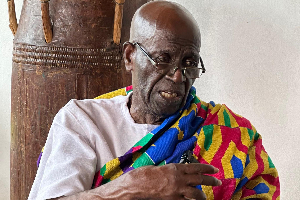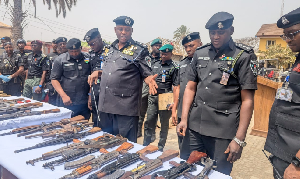The report of the official liquidators of Ghana Airways (GA) to the Chairman of the Ghana Airways Assets Disposal Committee of 2007, rescinding its earlier decision to lease one of its aircraft 9G-ANB to the lowest bidder, has sparked a heated controversy in government circles.
This follows a petition sent to the Minister of Transport, Mr. Mike Hammah, by one Duke Odiasempa, an Aviation expert who has an insight into the activities and operations of the defunct national airline, Ghana Airways.
He is asking for a thorough investigation, and review into the circumstances that led to the virtual sale of the aircraft to Messrs. Thameside of the United Kingdom, rather than CSDS Aviation of the United States, which bid the highest.
The sector Minister, Mike Hammah, has duly acknowledged receipt of Mr. Odiasempa’s petition, a copy of which is in the possession of The Chronicle.
He has however declined to make any categorical statement on it, except to say that it was under serious consideration, since “it raises more questions than answers.”
In his petition, Mr. Odiasempa raises questions about the property valuers of the aircraft - Price Waterhouse Coopers (PWC) - and how such a consultant was selected among others to evaluate the bids/bidders.
Officials of Price Waterhouse Coopers are however tight-lipped about their role in the entire liquidation of the airline. An official of the company, Richard Hodasi, yesterday told The Chronicle that the company does not disclose its dealings with their clients to third parties, and for that matter they cannot make any substantive input to the paper’s enquiries.
In the sales agreement of both Thameside and CSDS Aviation, Mr Odiasempa noted that Price Waterhouse Coopers (PWC) deliberately put different clauses in the various agreements to frustrate the highest bidder - CSDS.
According to him, the sales agreement itself was drawn by one of the most expensive legal firms in the UK, Beaumont and Sons Limited, which incidentally were solicitors for Ghana Airways. To him, the contentious clause that was in the sales agreement for Thameside was the aspect which stated: “the buyer of the Ghanaian aircraft shall indemnify the Ghanaian government for 2 years in a sum of $50 million,” asking whether this was done to make it easy for a supposed friend of the seat of government, the Castle, to get purchase the aircraft.
Mr Odiasempa indicated that CSDS Aviation petitioned the then President on the bad business practice on the sale of the aircraft.
He therefore could not comprehend why Price Waterhouse Coopers advised the official liquidator (Registrar General) to cut and ship the aircraft in boxes as scrap metal, when it was bought.
Meanwhile, he said CSDS had arranged for a heavy maintenance programme of the subject aircraft at an engineering base in Belgium to the tune of $4 million.
When the negotiations stalled, he noted, the Minister of Aviation at the time told Parliament that it would be solved in a month, in favour of CSDS Aviation.
Though Ghana Airways was said to be owing Agence pour la Securite de la Navigation Arienne (ASECNA) and Esblissement National de la Navigation Arienna (ENNA) at the time of the liquidation, both companies were said to have not chased Ghana Airways out of business, since according to Mr. Odiasempa, “they only made a claim when they knew Ghana Airways was not going to be in existence anymore.”
He therefore accused Price Waterhouse Coopers, its network, and Ghana missions abroad, of aiding the official liquidator to close the 12 Ghana Airways overseas offices that were still open at the commencement of the liquidation.
“Staff were not notified before the closure of various offices, and any payments made to the staff would amount to deliberately causing financial loss to Ghana as a whole,” he stressed, insisting, “It requires looking into by competent professionals, to ascertain if Price Waterhouse Coopers handled that aspect of issues properly.”
According to the expert, there should not have been any legal suit by the leasing company against the Ghana government and Ghana Airways, noting: “The suit came about as a result of Ghana Airways’ improper husbanding of resources to pay the BCI aircraft.”
Furthermore, Mr. Odiasempa stated that the overall financial summary of Ghana Airways would have to be properly interpreted to get qualified accountants, with the support from some commissioned people by the Minister, to better understand the figures and sale of its assets, saying, “one does not understand why the Ghana Forex Bureau Limited and Ghana Distribution System Limited yielded zero amounts during the liquidation process.”
Also, he indicated: “Price Waterhouse Coopers continued to tell a pack of lies to Ghanaians, and to frighten them that the Italian government was after the blood of Ghana Airways at the time the two DC 10 and others were strangely scrapped, according to the PWC report.”
Up till date, he says, older DC 10s still fly across the globe, including a freighter that flies in and out of Ghana.
“PWC had in effect indicted Ghana Civil Aviation Authority (GCAA), who are the regulatory authorities in Ghana representing ICAO, so to speak,” and that “Ghana Airways had a poor maintenance record, thus casting a heavy slur on the regulatory body.”
According him, this was ordinarily not true, stressing: “otherwise, GCAA inspectors would let any Ghana Airways aircraft fly.”
He noted that the scrapping of the equipment, especially the DC 10 aircraft, was doubtful, and was therefore calling for proper investigations to unravel the mystery surrounding the whole sale. More anon!
General News of Friday, 12 February 2010
Source: The Chronicle












